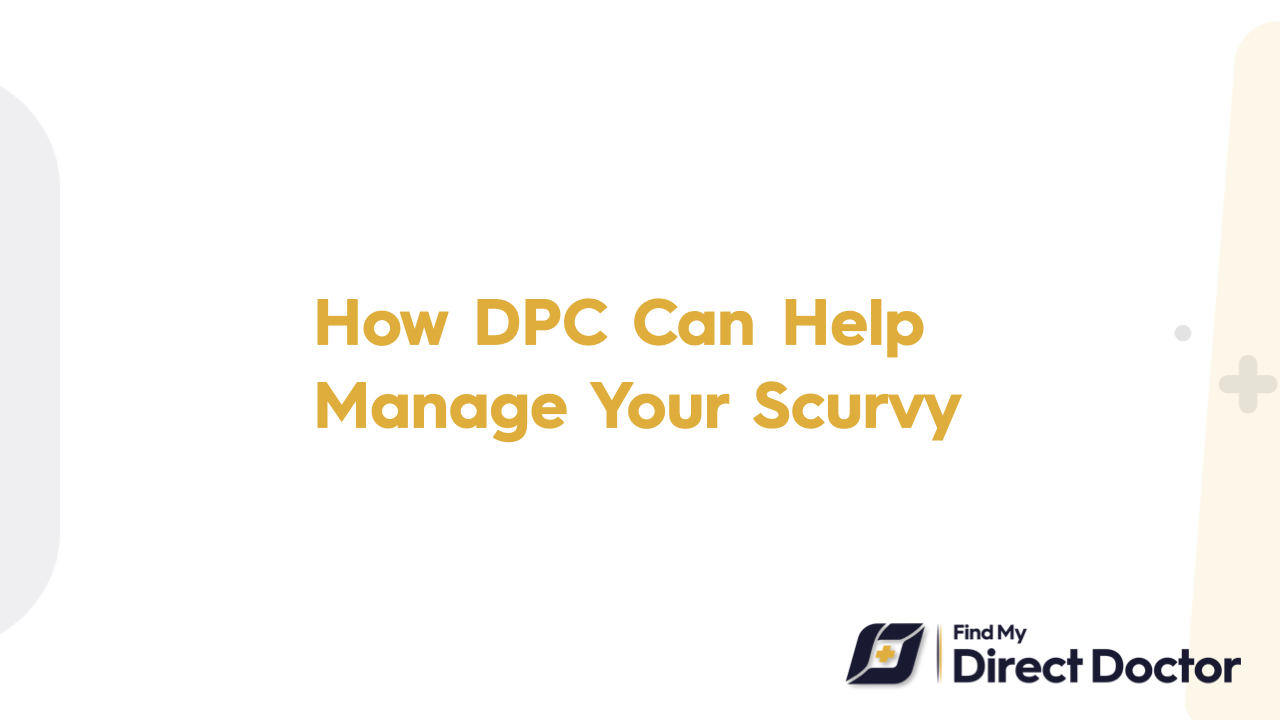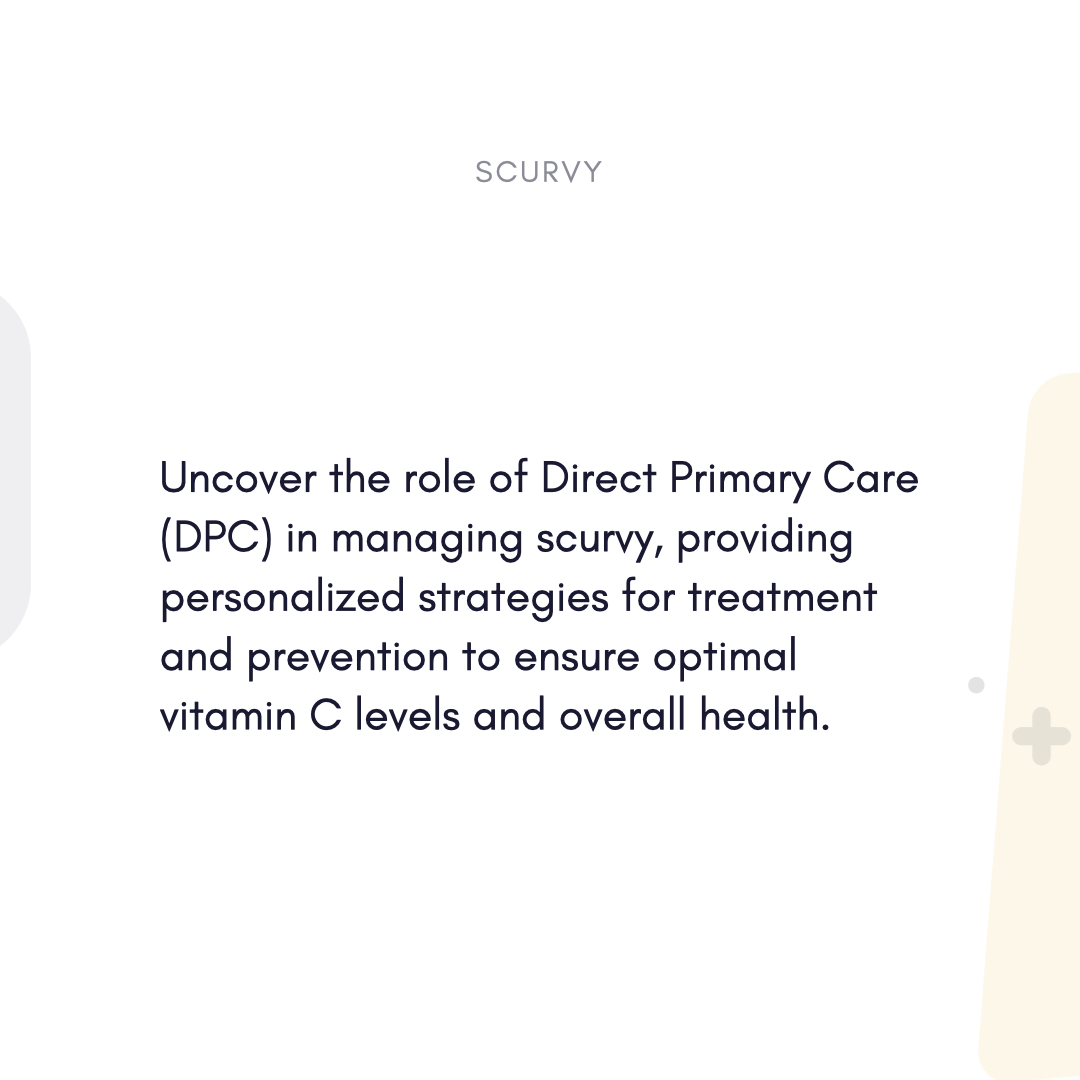Scurvy and Direct Primary Care (DPC): Reviving Health with Vitamin C and Personalized Care
Bleeding gums that make brushing a misery. Even standing seems impossible from such deep tiredness. For those with scurvy, this ancient vitamin C shortage is not only a historical oddity but also a contemporary health disaster when diets fail. Although conventional treatment sometimes ignores this "forgotten disease," Direct Primary Care (DPC) offers quick, all-encompassing treatment to undo scurvy and restore health.

Grasping Scurvy
Extended vitamin C shortage leads to scurvy and causes:
- Gingival bleeding as well as tooth loss
- Petechiae—easy bruising—inaction
- Anemia, poor healing of wounds, joint pain
- Weary, depressed
Groups with high risk:
- Elderly, alcoholics, restrictive diets (such vegan without supplements)
- Patients having malabsorption—crohn's disease, bariatric surgery
Scurvy is a neglected public health concern according to the World Health Organization.
DPC Changes Scurvy maintenance
Operating on a membership model usually ranging from 50 USD to 100 USD per month, Direct Primary Care (DPC) provides unlimited access to your physician for a set fee. For those with scurvy, this translates into no co-pays, no diagnostic delays, and a treatment plan as essential as your vitamin C levels.
1. Quick Diagnosis and Treatment
DPC's easily available approach guarantees:
- Same-day bleeding gum or unexplainable tiredness evaluations.
- Cash-pay labs allow in-office vitamin C testing using serum ascorbate levels.
- High dose oral or IV vitamin C is the immediate intervention.
2. Customized Root-Cause Analysis
DPC doctors design custom plans compliant with NIH recommendations:
- Dietary overhaul: meals heavy in bell peppers, citrus, broccoli.
- Daily supplements 1–2g vitamin C, modified for absorption problems.
- Management of comorbidity: dental referrals, iron injection for anemia.
3. Complete, reasonably priced assistance
DPC lowers dietary and financial gaps by:
- Cutting costs: vitamin C pills sold wholesale (5 USD instead of 25 USD).
- Telehealth access available 24/7: Control side effects (such as diarrhea) from supplements.
- Cooking demonstrations and low-cost grocery lists help preventative education.
DPC's advantages for scurvy sufferers
1. Unlike Accessibility
- Consult 24/7 for severe conditions including hemarthrosis (joint bleeding).
- Not waiting for lab results or dietitian referrals.
2. Customizable Interventions
- Thiamine plus vitamin C helps prevent Wernicke-Korsakoff.
- Patients on bariatrics: sublingual vitamin C for malabsorption.
3. Open Cost Transparency
- Included are consultations, basic labs, and care coordination under membership.
- Typical savings: 1,000 USD plus by skipping specialist co-pays and ER visits.
Personal Success Stories from Real Life
- Case 1: Using DPC's IV vitamin C and meal delivery system, Mr. Lee, 72, on a "tea and toast" diet reversed bleeding gums.
- Case 2: Using dietary advice and sublingual C, 30-year vegan Crohn's disease patient Sarah has normal levels.
Often asked questions: DPC and Scurvy
- Q: Can DPC treat severe scurvy accompanied with leg ulcers?
- A: Indeed. DPC arranges IV vitamin C infusions and wound treatment.
- Q: For low-income patients, is DPC reasonably priced?
- A: Perfectly true. Donations of vitamin C and sliding scale fees help to make care possible.
- Q: What about genetic testing for problems with absorption?
- A: DPC plans SLC23A1 gene tests for suspected transporters' defects.
Why DPC Wins for Scurvy Patients?
Emphasizing DPC's alignment with nutritional care standards, the Academy of Nutrition and Dietetics supports:
- Precision: Matching doses to lifestyle and degree of deficiency.
- Tools to monitor vitamin intake and symptoms help empower you.
- Trust: A team that is compassionate replaces contemptuous "it's just diet."
Get Your Health Back under Control One citrus fruit at a time.
Scurvy need not be a silent punishment. Every juicy orange, every bright day, DPC gives you a partner who listens deeply, treats quickly, and walks with you from weakness to wellness.






